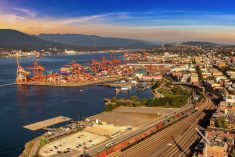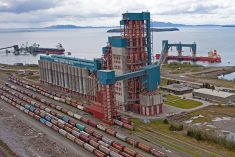Reuters — Government officials in British Columbia on Monday extended restrictions on the use of fuel by residents, saying it was needed for emergency vehicles as the region recovers from devastating floods.
The order, first issued on Nov. 19, limits vehicles deemed “non-essential” by the government to 30 litres of gasoline or diesel fuel per trip to a filling station.
The restrictions will be extended through Dec. 14 as part of a state of emergency in the flood-hit province, provincial Public Safety Minister Mike Farnworth told a news conference.
Read Also

More Canadian companies at Agritechnica 2025
A record number of Canadian agriculture machinery and tech companies are at Agritechnica 2025, with exporters being more aggresive looking for new markets.
“Essential vehicles” will continue to have unrestricted access to fuel as required, using mainly commercial trucking cardlock stations, the province reiterated Monday.
Vehicles deemed “essential” under the order still include “agricultural and farm-use vehicles, including vehicles supporting flood response” as well as “veterinarians supporting flood response.”
Commercial transport trucks for critical goods and services such as food and beverages, as well as refrigerated trucks and grocery delivery vehicles, are also still deemed essential.
“The fuel conservation measures are working but with another storm on its way, we are extending the order to ensure that we prioritize emergency services for another two weeks,” Farnworth said Monday. “This recovery will take time.”
Officials have restricted travel on several major routes in the area and another, Highway 1, remains closed.
Four people were killed and the province is facing billions of dollars of damages after an atmospheric river dumped a month’s worth of rain in two days on southern B.C, triggering mudslides and washouts that destroyed road and rail routes between the mountainous interior and the coast.
Evacuations have been ordered after weather forecasters predicted that the third in a series of strong storms would pummel British Columbia on Tuesday.
— Reporting for Reuters by Dan Whitcomb; includes files from Glacier FarmMedia Network staff.














